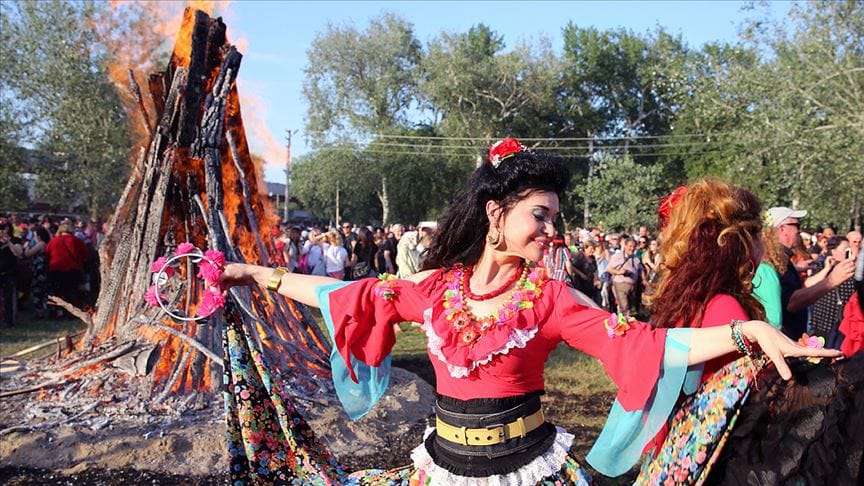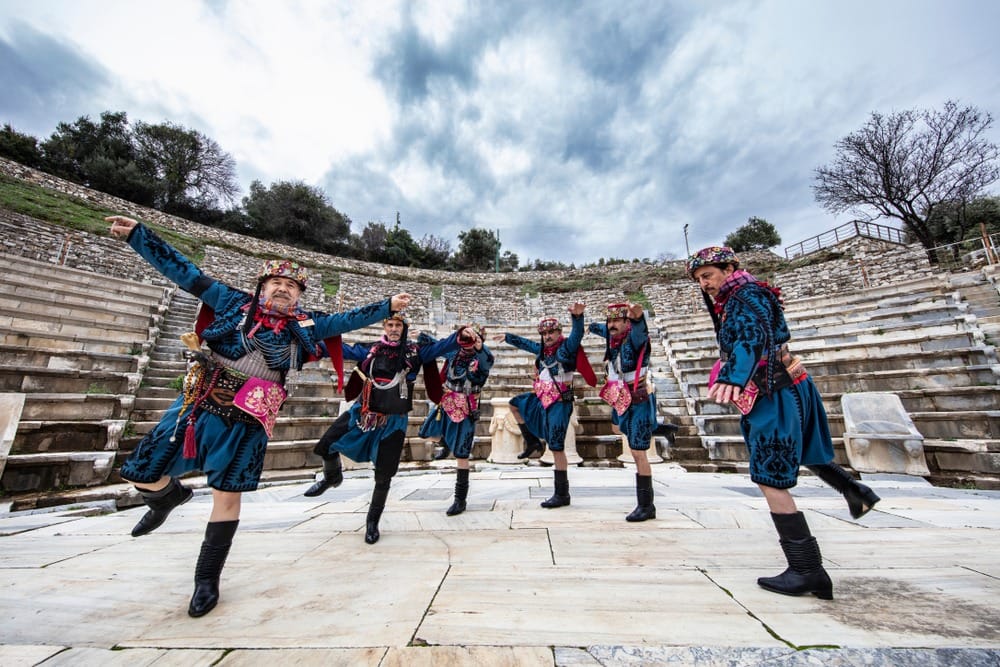Traditional markets and festivals offer great opportunities for those who want to explore local culture and have authentic experiences. These events, held all over Turkey, provide the opportunity to both get to know local life and create unforgettable memories. Here are some traditional markets and festivals worth exploring:
Kırkpınar Oil Wrestling Festival – Edirne
Kırkpınar Oil Wrestling Festival, which dates back to the 14th century, is held in Edirne every July. In this festival, one of the oldest sports events in Turkey, you can watch the fierce struggle of wrestlers and get to know the Turkish wrestling tradition closely.
International Aspendos Opera and Ballet Festival – Antalya
This festival, held in Antalya’s historical Aspendos Ancient Theatre, brings together opera and ballet lovers. You can watch the performances of world-famous artists in this ancient theater famous for its unique acoustics.
Hıdrellez Festivals – Throughout Türkiye
Hıdrellez Festivals, organized to celebrate the arrival of spring, are celebrated in May in many parts of Turkey. The arrival of spring is welcomed with enthusiasm by jumping over fires, making wishes and various activities.
You can get to know Turkey’s rich cultural heritage and local life closely by wandering around traditional markets and festivals in the footsteps of local culture. These events will add color to your trip and provide unforgettable experiences.
Colorful and Lively Markets: Local Products and Handicrafts
Offering the most vivid examples of local culture, markets are like a treasure waiting to be discovered for travelers. Colorful markets located all over Turkey offer lively and cheerful environments where local products and handicrafts come together. Here are some of Turkey’s colorful markets:
Alanya Bazaar – Antalya
Alanya’s historical bazaar is a center where local handicrafts and souvenirs are abundant. Here you can find handcrafted rugs, ceramics, silver jewelry, local clothes and many other handmade products. The bazaar is located in the narrow streets of the old city and is a place where you can both shop and enjoy the historical atmosphere.
Saturday Market – Ayvalık
This market, held on Saturdays in Ayvalık, offers the best examples of the region’s local products and organic agriculture. You can find products such as fresh vegetables, fruits, honey and cheese, especially olives and olive oil, here. In addition, handmade soaps, natural cosmetics and souvenirs are among the products frequently seen in the market.
Wednesday Market – Trabzon
This market, held every Wednesday in Trabzon’s Çarşamba district, offers fresh and organic products of the Black Sea. In addition to delicacies such as local cheeses, honey, hazelnuts and cornbread, you can also find handmade carpets, copper embroidery and other handicraft products here. The market is also important as a socialization and shopping center for local people.
Göreme Bazaar – Cappadocia
Located in Göreme, the popular tourist center of Cappadocia, the bazaar offers unique handicrafts and souvenirs of the region. Miniature models of Cappadocia’s famous fairy chimneys, handmade ceramics, stonemasonry products and many other unique souvenirs can be found here. Additionally, local wines and handmade desserts are among the popular products in the market.
Traditional Festival Histories and Performances
Traditional festivals that reflect Turkey’s rich cultural heritage are important events that have been going on for centuries. These festivals keep local culture alive, traditions continue and the community comes together. Here are some of Turkey’s important traditional festivals:
Aspendos Opera and Ballet Festival – Antalya
This festival, held in Antalya’s historical Aspendos Ancient Theatre, hosts world-famous opera and ballet artists. Known for its magnificent acoustics, the ancient theater offers art lovers an unforgettable cultural experience.
Izmir Kemeraltı Wrestling – Izmir
Wrestlings held every year in Izmir’s historical Kemeraltı Bazaar are an important part of Turkish wrestling culture. These competitions, held in traditional costumes, attract great attention from local people and visitors.
Pottery Festival – Avanos, Nevşehir
The Pottery Festival, held in Avanos, one of the popular centers of Cappadocia, aims to promote the handicrafts and cultural heritage of the region. The festival organizes colorful events with pottery making shows, exhibitions and local music.
Mevlana Commemoration Ceremonies – Konya
Mevlana Commemoration Ceremonies, held every December in Konya, aim to commemorate the death anniversary of Mevlana Celaleddin Rumi and keep his philosophy alive. Sema performances, concerts and panels are held during the ceremonies.
Malatya International Film Festival – Malatya
This film festival held in Malatya is considered an important cultural event in Turkey. Films from the national and international cinema world are shown, interviews are held with directors and film lovers come together.
These festivals provide excellent opportunities for those who want to explore Turkey’s rich cultural diversity and history. Each activity reflects the unique traditions and art of its region, making your trip more meaningful.
Folkloric Dances and Music Performances
Folkloric dances and musical performances in various regions of Turkey form an important part of our rich cultural heritage. These performances contribute to the survival of local culture with local costumes, original musical instruments and enthusiastic dances. Here are some of Turkey’s colorful folkloric dances:
Zeybek – Aegean Region
Zeybek, the traditional dance of the Aegean Region, is especially common in provinces such as Izmir, Aydın and Manisa. This men’s dance, based on a flamboyant and heroic theme, is usually performed with the accompaniment of drums and pipes and symbolizes courage, strength and endurance.
Horon – Black Sea Region
Horon, the enthusiastic and dynamic dance of the Black Sea, attracts attention with its fast rhythms and figures performed in groups. Horon, which is common in provinces such as Trabzon, Rize and Artvin, is usually played accompanied by kemenche and tulum and reflects the power of nature and the sea.
Halay – Eastern Anatolia Region
Halay, the energetic and enthusiastic dance of Eastern Anatolia, is usually performed on special occasions such as weddings and holidays. Halay, which is frequently seen in provinces such as Erzurum, Erzincan and Ağrı, is colored with mass dances staged by large masses of people and symbolizes solidarity and unity.
Spoon Games – Southeastern Anatolia Region
Spoon Dances, one of the fun and colorful dances of Southeastern Anatolia, are characterized by rhythmic figures usually performed by playing spoons. These dances, which are common in provinces such as Diyarbakır, Mardin and Şanlıurfa, attract great attention at traditional weddings and festivals.
Welcoming – Mediterranean Region
The elegant and melodic dance of the Mediterranean, Greeting, is usually performed with the accompaniment of instruments such as drums, pipes and baglama. Welcome, which is common in provinces such as Antalya, Mersin and Adana, is usually played at weddings and special celebrations and expresses love and tolerance.
These folkloric dances and musical performances reflect the cultural diversity and richness of Turkey. Each offers unique shows that reflect the history, nature and social structures of its region. Watching these shows is a great opportunity to get to know Turkish culture and people better.
Local Flavors: Street Food and Traditional Flavors
Every corner of Turkey is full of unique street delicacies and traditional tastes. These flavors have an important place in the daily life of local people and offer unforgettable taste experiences to visitors. Here are Turkey’s famous street foods and traditional tastes:
Simit
Simit, which has become the symbol of Turkey, is a crispy bread snack with sesame seeds. Simit, which is generally consumed for breakfast, is sold at street stalls and in front of bakeries.
Rotary
Döner, one of the indispensable flavors of Turkish cuisine, is a dish in which thinly sliced meat is served between wraps or bread. It can be found especially in doner shops in big cities such as Istanbul, Izmir and Ankara.
Chestnut
Chestnuts, an indispensable street delicacy on cold winter days, are usually sold at street vendors’ stalls or in city squares. You can’t get enough of its taste, especially in the winter months.
Stuffed mussels
One of Istanbul’s symbolic delicacies, stuffed mussels are mussels stuffed with spicy rice. It is served with lemon juice and spices at street stalls.
Hot Drinks: Salep and Boza
Salep and boza, drunk on cold winter days, are traditional hot drinks of Turkish streets. While salep is prepared with milk and salep powder, boza is made with the water of fermented wheat.
These street foods and traditional tastes are a great starting point for anyone who wants to discover the cultural and gastronomic richness of Turkey. Tasting these delicacies while wandering the streets of cities allows you to enjoy being a part of local life and culinary culture.
Handicraft Workshops and Works of Masters
Türkiye is known for its rich handicraft tradition and the unique works of its masters. It is possible to find a different handicraft master and workshop in every corner. Here are some important handicrafts and masters’ works that you can find in Turkey:
Ceramic Workshops – Avanos, Cappadocia
Avanos, the popular tourist center of Cappadocia, is famous for its handmade ceramics. Here, you can see pottery, vases and ornaments made of clay. Ceramic masters create unique works by combining traditional techniques with modern designs.
Coppersmithing Workshops – Gaziantep
Gaziantep is one of the cities with the strongest coppersmithing tradition in Turkey. Here, handmade copper pots, coffee pots, trays and other kitchen utensils are produced. Masters create quality and aesthetic products by maintaining traditional techniques since the Ottoman period.
Rug Weaving Workshops – Göreme, Cappadocia
Another handicraft area of Cappadocia is rug weaving. There are rug weaving workshops in many villages in and around Göreme. Here, hand-woven rugs are produced using natural dyes. Each rug is decorated with unique patterns that reflect the geography, culture and colors of the region.
Miniature Art Workshops – Istanbul
Miniature art in Istanbul has been an important handicraft tradition since the Ottoman period. This art is characterized by small size and detailed paintings. Miniature artists produce works of art by blending traditional themes and techniques with modern understanding.
Stonework Workshops – Mardin
Mardin is famous for its stonemasonry and there are many stonemasonry workshops in this city. Here, stones used to decorate historical buildings are processed and works decorated with traditional motifs are produced. Masters design products that highlight the natural properties and aesthetics of the stone.
These handicraft workshops offer excellent opportunities for those who want to discover Turkey’s cultural heritage and artistic richness. Each of them gives you the chance to closely observe the original works of the masters and the intricacies of handcraftsmanship.
See you in the next post,
Anil UZUN

